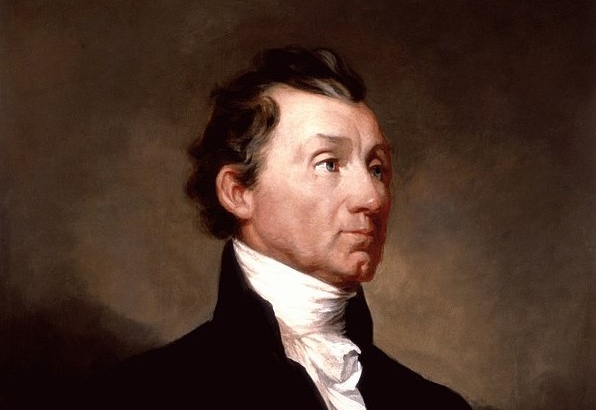December 2, 1823: The Monroe Doctrine for United States Foreign Policy is Issued
Realpolitik and Idealism Coupled: A Brief History of the Monroe Doctrine
The Monroe Doctrine remains one of the most influential foreign policy statements in United States history. The principles it espoused were largely consistent with the foreign affairs doctrine of non-interventionism in European affairs that were followed by the first U.S. presidents. Even by the twenty-first century, at times when U.S. geopolitical strategies were drastically different from those of the early nineteenth century, some foreign policy makers still invoked the Monroe Doctrine when prioritizing the spread of democracy and the well-being of the Western Hemisphere over other parts of the world. One of the key reasons for its longevity and success was because it established a foreign policy rooted in a combination of realism and idealism.
In the early days of the American republic, the U.S. remained largely uninvolved in the affairs of Europe and the rest of the world. As George Washington stated in his Farewell Address, “Europe has a set of primary interests which to us have none; or a very remote relation…Hence, therefore, it must be unwise in us to implicate ourselves by artificial ties in the ordinary vicissitudes of her politics, or the ordinary combinations and collisions of her friendships or enmities.” The young nation could ill-afford to become involved in the squabbling affairs of the Old World as it needed to focus more on its own internal development.
Despite the best attempts by the U.S. in the late eighteenth and early nineteenth centuries to avoid entanglements with Europe, foreign policy issues abounded. Spain, Britain, France, and Russia all sought to lay claim to vast swaths of territory on the North and South American continents. A number of these, especially Spanish colonies in Latin America, began revolutions in the early nineteenth century to claim self-governance. The so-called “Holy Alliance” of Prussia, Austria, and Russia emerged in 1815 after the Napoleonic Wars with the established purpose of protecting monarchy around the globe. After the Holy Alliance and France successfully re-instated the Spanish king following a revolution, it then turned to putting down the liberal revolutions occurring in the New World. The U.S. hardly blinked at the Spanish restoration as it had no impact on its affairs. However, the prospect of European armadas barging into the Western Hemisphere to put down movements that followed the spirit of the American Revolution posed a threat to U.S. security.
In response to potential intrusions into South America, U.S. President James Monroe decided to release a stunning declaration to the world. He laid out his policy in his Seventh Annual Message to Congress in December 1823. First, Monroe addressed the continual colonization of the New World by European powers, stating, “the American continents, by the free and independent condition which they have assumed and maintain, are henceforth not to be considered as subjects for future colonization by any European powers.” He then proceeded to discuss the attempts by European nations to interfere in Latin America’s revolutions. “With the movements in this hemisphere we are of necessity more immediately connected…The political system of [European monarchs] is essentially different…from that of America. We owe it, therefore, to candor and to the amicable relations existing between the United States and those powers to declare that we should consider any attempt on their part to extend their system to any portion of this hemisphere as dangerous to our peace and safety,” Monroe continued. While Monroe conceded that European powers would be allowed to keep the colonies they held at the time, this announcement had the potential to drastically alter geopolitical affairs in the New World. By framing his doctrine in this manner, Monroe established a policy that simultaneously protected American interests in the Western Hemisphere while also supporting self-government from absolutism.
As bold of a declaration as the Monroe Doctrine was, it would have been largely ineffectual without the support of the British navy in helping to enforce it. The American navy did not have the resources to patrol the entire Western Hemisphere to prevent colonization by European powers. However, Britain—the most liberal of the major European powers of the time—did. It was using its navy to protect free trade around the world and the prospect of additional New World colonies, with their closed markets, would have harmed this economic policy. In fact, Britain’s Foreign Minister George Canning approached U.S. officials earlier in 1823 with a plan to release a joint-declaration to deter intervention in the New World. However, Secretary of State John Quincy Adams convinced Monroe that Britain had imperial motivations for wanting a joint-declaration, and a unilateral proclamation was announced. Even then, British self-interest in a largely de-colonized Western Hemisphere ensured that the U.S. would have a partner in enforcing its new hegemony.
The Monroe Doctrine helped the U.S. remain distant from European affairs and allowed it to chart a path to dominance in the Western Hemisphere. While initially largely symbolic, it would eventually be invoked by presidents ranging from Ulysses Grant to Teddy Roosevelt to John F. Kennedy to justify U.S. military interventions in the Western Hemisphere. According to the Monroe Doctrine, the success of American ideals of liberty and self-government in the Western Hemisphere went hand-in-hand with U.S. security. This coupling was in large part what made the doctrine so successful and why it has lasted as a cornerstone of American foreign policy. By claiming a hegemony in the New World that would support liberal values against absolutism, the U.S. began on its path to becoming the leader of the Free World for two centuries.
Joshua Schmid serves as a Program Analyst at the Bill of Rights Institute.
Click Here to have the NEWEST essay in this study emailed to your inbox every day!
Click Here to view the schedule of topics in our 90-Day Study on American History.




Join the discussion! Post your comments below.
Your feedback and insights are welcome.Feel free to contribute!